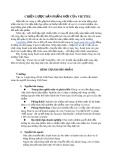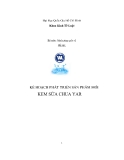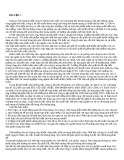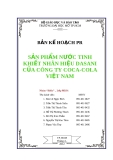
Operation strategy for Black tea product
Viettea
A product of VinaGangz.Ltd from the fllowing founder:
1. Tran Trong Dat
2. Nguyen Th Ng c Anhị ọ
3. Hoang Van Hanh
4. Nguyen Khanh Linh
5. Vu Hong Ha
Introduction about Vinagangz:
Operation strategy for our new product “ Viettea”
I. Niche market and competitive priorities
II. Designing of Viettea
III. Process to produce Viettea
IV. Location for the manufacturing
V. Production plan and MRP
VI. Scheduling
VII. Inventory
VIII. Quality management

I. Niche market and competitive priorities
A. Niche market
Our company has chosen Russia as the suitable market for our black tea products,
Because
1. Small domestic market capacity
Vietnam is considered as the "cradle" of the world tea industry, quality tea is
good, has a long tea culture, but the consumption of tea in the country is too low.
According to leaders of the Vietnam Tea Association, our country has nearly 90 million
people, but the tea consumption in the country only reached 30,000 tons of tea per year, if
the average per capita only reached 300gr tea / person / year. This figure is too low
compared to the potential of the domestic market. According to the General Statistics
Office of Vietnam, in 2016, the country has a tea plantation area of 131,500 hectares;
Output reached 1,020,000 tons. Meanwhile, the average per capita tea consumption in
China is more than 1kg of tea per capita per year, in Japan it is 2kg per capita per year, in

Middle East countries it is more than 2kg per capita per year in Russia. , England is over
2.5kg / person / year, nearly 10 times the consumption of tea in Vietnam.
Market capacity is too small, which will be a difficult factor for Viettea when
producing tea in the condition of limited tea demand.
2. Demand for tea in Russia is very high
Tea is one of the most popular drinks of the Russian people, with about 98% of
the population drinking tea, in the past few centuries, tea is increasingly asserting its
position as the most popular drink in Russia with the effect The tea is the only beverage
the government passes and the list of essential consumer items is a strategic item equal to
salt, cooking oil and national reserves. war precautions, natural disasters.
Russia is one of the 10 largest consumers of tea in the world and ranks third in the
world's largest tea consumer. Average consumption of tea per capita increased from 0.56
kg / person -1994 to 1.01 kg / person -1997 and 1.1 kg / person since 2000. The growth
rate of pepper demand average annual average of 11.3% in the last 10 years; With stable
demand growth, total tea consumption of the mussel market is about 150 thousand tons /
year, worth over 250 million USD / year.
Currently there are around 3,000 different types of tea (green tea and processed
tea) in the world. Among them, over 1000 kinds of tea have different brands. Black tea is
the most popular and traditional tea consumed in Russia accounting for 90% of total tea
consumption. Demand for high-quality and high-value tea has increased rapidly in recent
years and accounts for about 5% of total consumption (green tea 1%, tea 4%). However,
Russia has to import up to 99% of tea materials, mainly from Sri Lanka, India, China,
Vietnam, Indonesia, Kenya. Therefore, the Russian market is a fertile market and there
are many opportunities for development of Viettea's tea products.
3. Agreements and trade promotion programs between Vietnam and Russia.
Free Trade Agreement Vietnam - Eurasia Economic Union, 2018 (VN-EAEU
FTA)

On May 29, in Kazakhstan, Prime Minister Nguyen Tan Dung and other Prime
Ministers of the Eurasian Economic Alliance, including Russia, Armenia, Belarus,
Kazakhstan and Kyrgyzstan, officially signed the Trade Agreement (FTA) between
Vietnam and the Eurasian Economic Coalition.
Ministry of Foreign Affairs of Vietnam has informed in writing that the two sides
have completed the ratification procedures and the FTA between Vietnam and the
Eurasian Economic Union officially took effect from October 5,
According to the Decree on the Free Trade Agreement between Vietnam and the
EEA (VN-EAEU FTA), in 2018, 5,535 tariff lines will be cut to 0% and 3,720 tariff lines
will be continued. to 0% in which black tea products are taxed according to the schedule
with tariffs of 26.7% in 2016 and to 2018 only 13.3%. This will be a great opportunity for
Viettea to enter the Russian market when it is able to compete on prices for other tea
products in the Russian market.
Not only that, implementing the national trade promotion program approved by
the Minister of Industry and Trade in Decision No. 4838 / QD BCT on 28/12/2018
Vietnam Tea Association organizes trade and tourism delegations. at the Coffee and Tea
Expo Russian Market
Through the program, enterprises can promote the promotion of Vietnamese tea
products in this market and at the same time create opportunities for enterprises to meet
directly with tea partners and importers. of Russia and its neighboring countries.
Expanding the market and exploiting information, finding potential market
partners, maintaining existing partnerships, promoting trade and import and export of tea.
Organizing trade delegations to help businesses catch the latest happenings in the
market, grasp the needs of consumers tastes learn about the packaging design products.
Access to, understand the rules of international trade, the latest regulations on trade
quality and regulation of the market
4. Support for transportation from Russia
EXPERIENCE EXPOCENTRE, said Sergey Gusev, EXPOENTRE, has a
subsidiary that provides transportation and cargo clearance services.

Therefore, when participating in the fairs and exhibitions in the Russian
Federation, Vietnamese companies contacting the company will be instructed very
specifically about each type of documents.
On the issue of geographic location, the Russian Federation Government is
considering a special mechanism to transport rail freight from Southeast Asia to the
Russian Federation.
This mechanism will be very favorable for Vietnamese enterprises because rail
transportation will be faster and more economical than air and sea transportation.
This will help ease the cost of transporting tea products from Vietnam to Russia.
B. Competitive priorities
Our Black Tea product have a lot of competitive priorities with other
beverage product like:
1. Boosts Heart Health
There have been numerous studies revealing black tea’s positive impact on heart
health. A study published in 2017 looked at the effects of tea consumption on the risk of
ischaemic heart disease. The study looked at more than 350,000 men and women
between the ages of 30 and 79 from 10 areas in China. When the researchers followed up
about seven years later, they found that consumption of tea was associated with a reduced
risk of ischaemic heart disease as well as a lower risk of major coronary events (like a
heart attack).
Another study compared black tea (without additives) drinkers to plain hot water
drinkers for a period of 12 weeks. The black tea contained high amounts of flavan-3-ols,
flavonols, theaflavins and gallic acid derivatives. The researchers found that daily
consumption of nine grams of black tea resulted in “a highly significant decrease” of
cardiovascular risk factors, including triglyceride levels and fasting serum glucose. There
was also a significant decrease in the ratio of LDL to HDL cholesterol as well as an
increase in HDL (“healthy”) cholesterol levels. Overall, the researchers conclude that
drinking black tea “within a normal diet” leads to a decrease in major cardiovascular risk
factors, and it also boosts antioxidant levels in humans.
2. May Help Fight Cancer
Cancer fighter is also on the list of black tea benefits, as black tea consumption
has been linked with the reduction of certain types of cancer. For starters, a 2013 study







![Omachi: Sản phẩm mới [Năm hiện tại]](https://cdn.tailieu.vn/images/document/thumbnail/2012/20121122/tuanonlineit/135x160/4331353595854.jpg)

















![Bài giảng Nguyên lý marketing Chương 9: Trường ĐH Kinh tế, HN [chuẩn nhất]](https://cdn.tailieu.vn/images/document/thumbnail/2025/20250514/antrongkim2025/135x160/37641768462871.jpg)
